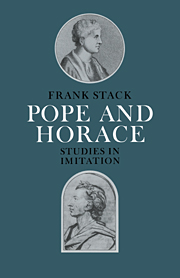Book contents
- Frontmatter
- Contents
- Acknowledgements
- List of abbreviations
- Preface
- PART I INTRODUCTIONS
- PART II THREE HORATIAN SATIRES (1733–4)
- 3 Raillery and energy: The Imitation of Satire II.i.
- 4 Horace, moral: The Paraphrase of Satire II.ii.
- 5 Horace, immoral: The Imitation of Satire I.ii. (Sober Advice)
- PART III MATURE HORACE (1736–7)
- PART IV THE TIME OF TENSION (1738)
- Epilogue
- Appendix: Imitations of Horace published 1730–40
- Notes
- Bibliography
- Index
4 - Horace, moral: The Paraphrase of Satire II.ii.
Published online by Cambridge University Press: 08 January 2010
- Frontmatter
- Contents
- Acknowledgements
- List of abbreviations
- Preface
- PART I INTRODUCTIONS
- PART II THREE HORATIAN SATIRES (1733–4)
- 3 Raillery and energy: The Imitation of Satire II.i.
- 4 Horace, moral: The Paraphrase of Satire II.ii.
- 5 Horace, immoral: The Imitation of Satire I.ii. (Sober Advice)
- PART III MATURE HORACE (1736–7)
- PART IV THE TIME OF TENSION (1738)
- Epilogue
- Appendix: Imitations of Horace published 1730–40
- Notes
- Bibliography
- Index
Summary
Have you seen the last satire of Horace in which You are so ill treated? I could not find any method of sending it to you.
Pope to Bethel, 6 August 1734Pope must have realized that the triumph of the Imitation of Satire II.i. could never be repeated, and in pursuing the possibilities of imitating Horace he wisely turned to another type of Horatian satire, the moral diatribe. A year after his great success, in July 1734, he published a second edition of the first Imitation along with a companion piece, The Second Satire of the Second Book of Horace Paraphrased. Horace's Satire II.ii. is a diatribe on the virtues of the simple life, ostensibly reporting the views of a peasant, Ofellus. This is an early Horatian work, vigorously, almost naively moral, and to the modern reader its poetry seems, perhaps, too simple and too didactic. How did Pope respond to this kind of Horatian moral simplicity? Was he able to make it relevant to his own time and his own life?
Again, Dacier's reading of the Horatian satire provides a useful introduction. As we might expect, he speaks warmly of this poem, praising its moral sentiments, but his comments on Ofellus are much more striking. For Dacier the important thing about Ofellus is that he is neither a pleasure-loving Epicurean nor a rigid Stoic but rather an independent and ‘natural’ thinker who has worked out his own philosophy between those two extremes.
- Type
- Chapter
- Information
- Pope and HoraceStudies in Imitation, pp. 60 - 77Publisher: Cambridge University PressPrint publication year: 1985

